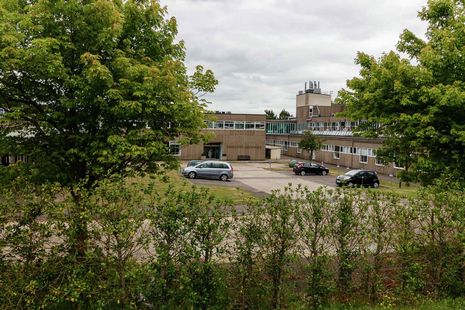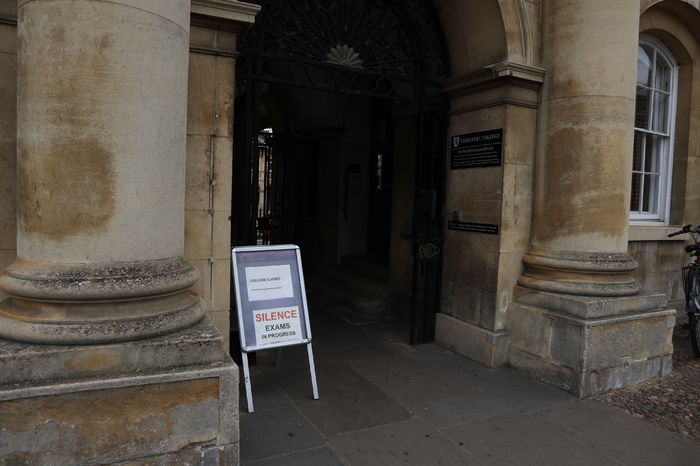There must be more to the sciences than exams
An anonymous student warns that, if STEM students are to flourish, their courses must be about more than cramming

Cambridge asks a lot of its students. Before we even leave school, we are pushed simply to meet offer requirements. Once I arrived, I suppose part of me thought that the ‘big scary exams’ would die down for at least a couple of years after A levels. But I’ve found it very difficult to let go of that feeling as we face the next set of Cambridge-imposed hurdles. “I’m sorry to bring it up, but it is exam season” is how a supervisor started a sentence last week. When a period is considered so anxiety-inducing that it must actually be whispered about, maybe it deserves closer examination. As a STEM student, however, the staggering volume of content we face means the shadow of ‘exam season’ looms long before Easter term.
Are exams the best way to assess students? Unfortunately, there is no simple answer. In Cambridge, few academics acknowledge that the point of their lecture series is really intellectual stimulation and enjoyment of your subject. As the year passes and – particularly as we come back for Easter term – like a switch, every student turns exam-focused. In a ‘lecture’ on exam format at this time, every student was writing furiously, and the Q&A session was certainly not short of queries. In first year, should this really be the driving factor?
“In STEM subjects, lectures are not optional”
A Cambridge academic once told me how horrified they were when a supervisee asked them: “is this going to be in the exam?” They explained how supervisions are a unique way to enjoy your subject, not to learn how to pass a test. I nodded along, but inside I really hoped the student’s question had been answered. I would love to sit back and enjoy my degree for my subject’s sake, but when I write (open book) essays for supervisions, all I can think while submitting it is “how will I ever write this from memory in an exam?”
In STEM subjects, lectures are not optional, nor are they a springboard for your own reading. Instead, they’re the closest that can be obtained to a specification: it all needs to be learnt. As Natural Sciences students all our exams are closed book, yet the volume of information we’re expected to commit to memory is vast. Handouts written by the lecturers contain the information we’re expected to learn, yet lecturers frequently run out of time to cover the level of detail they include. At this point, it becomes the student’s responsibility to go through the handout in their free time and pick up that slack – because if it’s in the handout, it’s ‘fair’ game for the examiners. It is exhausting to know every word said in a lecture is expected to stick when you’re trying to read slides and an even more detailed handout simultaneously.
Sheer workload threatens the intellectual fulfilment sought by students. I’ve left a few supervisions buzzing about how interesting I’ve found the content or from hearing my supervisor talk about a new discovery in our field. But in most cases, there isn’t time for this kind of ‘extra content’ or discussion – although this is something I hope will improve in the biosciences as I specialise. For now, though, it seems impossible to squeeze this in. In the physical sciences, supervisions consist of a regimented hour spent going through the answers to this week’s question sheet. This does not tend to fill one with excitement for one’s subject. Additionally, even these can overrun by a half hour or more. I once had to decline a third Zoom call from a supervisor at 9pm on a Saturday night after two sessions had already elapsed, and explain I had not had a break to eat dinner yet.
“I once had to decline a third Zoom call from a supervisor at 9pm on a Saturday”
Workload and exam stress go hand in hand, particularly in Easter term. For many IA Natural Sciences students, new examinable content is taught until the week before exams. Balancing labs, new content, supervisions, and finding time to revise is near impossible. With an already huge volume needing revision, new (examinable) content should not be taught for a full month in Easter term, but have a maximum of two weeks. It’s incredibly difficult to take in new material while revising, and many of my peers voiced how Easter term topics felt like they went in one ear and out the other. Time dedicated to re-covering them was at the cost of topics from earlier in the year; the gap between the end of teaching and the start of exams felt insufficient to cover topics to the expected level. This is despite most Natural Sciences students (myself included) spending a huge amount of their Christmas and Easter holidays revising. Academics often seem to treat the ‘break’ as an infinite stretch of time in which to commit content to memory, when in reality it’s an essential recovery period for burnt-out students.
I am grateful for the small group teaching and unique learning style that I have benefitted from at Cambridge. However, serious reform is needed. The teaching review’s proposal to abolish Saturday lectures could be a start, but only if the equivalent time and content is removed from the course entirely and not slotted elsewhere in the week. Beyond this, STEM courses need exams which test skills beyond rote memorisation, and exam formats which give students flexibility so they can focus on topics they are interested in. This also requires breathing room in handouts: instead of covering the specification in a ridiculous degree of detail, let handouts be an outline which still covers the minimum, and then students can reach that extra detail if they wish in the topics they enjoy.
I always say I hate Tuesdays, but maybe that’s just because my timetable means I don’t have time to have lunch until a ten-minute slot at 3pm. In the hope that workload doesn’t make every day feel like a Tuesday, I cling to loving my subject and hearing my coursemates voice these same frustrations. When I accepted my Cambridge offer, I expected academic rigour to complement the prestige of the degree. That prestige does not justify a system with gratuitously high workloads and schedules, in which first years feel as though they are set up to fail.
 News / Colleges charge different rents for the same Castle Street accommodation2 March 2026
News / Colleges charge different rents for the same Castle Street accommodation2 March 2026 News / News in Brief: waterworks, wine woes, and workplace wins 1 March 2026
News / News in Brief: waterworks, wine woes, and workplace wins 1 March 2026 News / Climate activists protest for ‘ethical careers policy’1 March 2026
News / Climate activists protest for ‘ethical careers policy’1 March 2026 News / Angela Merkel among Cambridge honorary degree nominees27 February 2026
News / Angela Merkel among Cambridge honorary degree nominees27 February 2026 News / Private school teacher who lied about Cambridge degree barred from teaching27 February 2026
News / Private school teacher who lied about Cambridge degree barred from teaching27 February 2026









